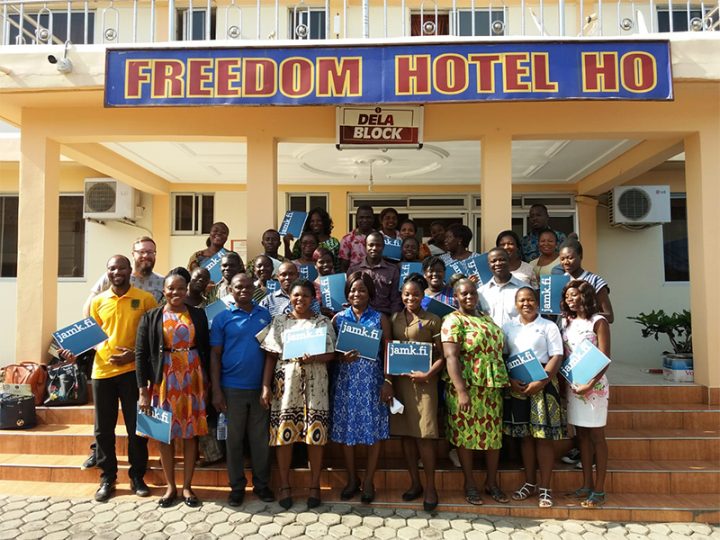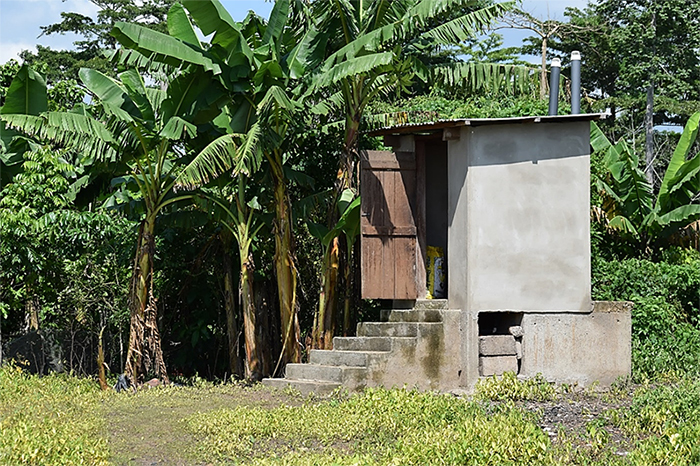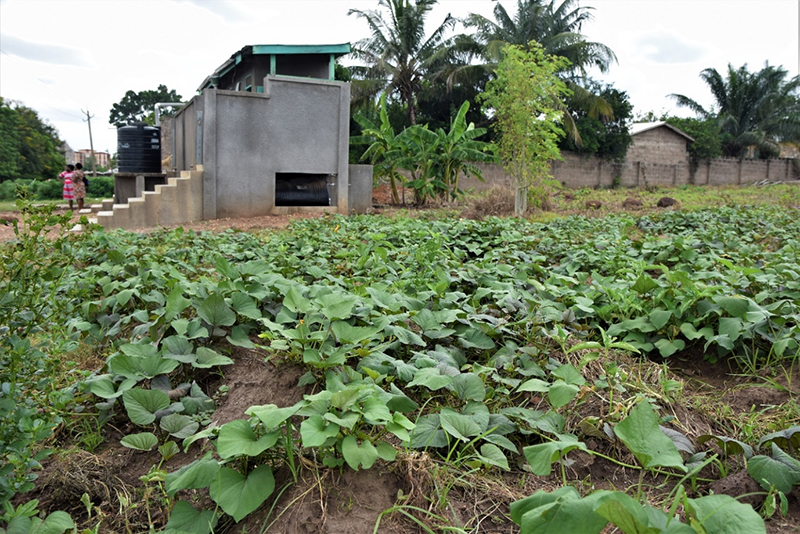Solving the complex issue of basic sanitation in rural Ghana

Ho Municipal Officials celebrating their certificates on basics of sustainable sanitation after a training workshop organized by the Finnish partners. Officials work in the rural and urban communities to encourage households to acquire a toilet facility. (Photo: Teemu Häyrinen 2019)
Starting from 2019, JAMK University of Applied Sciences has been partnering in a sustainable sanitation development project in Ghana, West Africa, together with the Global Dry Toilet Association of Finland and LAB University of Applied Sciences as well as Ho Technical University and Ho Municipal Assembly. The project, ODF2030 – Sustainable sanitation for Ho Municipality, Ghana, supports the work towards United Nations Sustainable Development Goal number 6, clean water and sanitation for all. In line with the Goal, Ghana is aspiring to develop its sanitation status, so that each household would own a toilet by 2030. Project is funded by the Ministry for Foreign Affairs of Finland and it lasts until 2022.
In the ODF2030 -project, our approach is to introduce locally suitable and sustainable sanitation solutions to the major national and regional development programmes promoting sanitation development and investments in rural and urban areas. ODF is a term for ‘open defecation free’ which is a status awarded to communities where every household has a basic sanitation facility – and no household is relying on going to bushes to relieve themselves. In Ho Municipality, currently less than 10 out of more than 120 rural communities can boast having such status and lack of household toilets is also common in the urban areas.
Why would you build a house without a toilet?
All in all, there is a long road for achieving total sanitation in Ghana by 2030. Currently, 81 percent of people lack access to improved sanitation or are entirely without toilet facilities. While economic barriers, including high costs of construction and lack of capital for investment, certainly account for their part of the problem, it is not the full story. The sanitation progress in Ghana has been slow in comparison to many countries with far inferior income levels. The lack of funds is simply not the only explanation to the situation.
From the Finnish perspective, it seems unimaginable to build a brick house with many rooms yet leave out a toilet. However, this is still a quite common sight in Ho Municipality. Reasons can be found from the long-term dependency on public sanitation services and donors, traditional beliefs and practices, lack of cultural paradigm for toilet ownership, issues related to landownership and tenants’ rights as well as lack of suitable models in the markets.
Sanitation solution can be considered sustainable if it is economically, socio-culturally and environmentally sustainable. A sustainable sanitation solution should be economically feasible for the people to procure and maintain. As a part of the economic evaluation, the technical evaluation plays a role when considering replacement and maintenance costs. In the tropical conditions, termites, flash floods, sun and heat affect the durability of a structure which needs to be considered in the choices of materials. Secondly, the toilet must be culturally acceptable and in line with the social norms of the society. Finally, a sustainable sanitation solution is a system that is isolating and destroying pathogens from human excreta to avoid contamination of water sources and spread of waterborne diseases.
Currently, the standard toilet models promoted in Ghana do not meet the sustainability criteria which makes them unattractive investments to the people. Water closet is too expensive and, without a wastewater treatment system, the waste is simply transferred another site with a clear risk of contamination of water bodies. Different types of pit latrines fail in terms of cultural acceptability and environmental sustainability. They are also not suited for urban areas, as emptying is often not possible, and the structure needs to be discarded after the pits are full. In these conditions, outbreaks of cholera occur especially in the rainy season and in general, the risk of water borne diseases is classified very high.

Dry toilet offers a sustainable option to solve sanitation crisis
The ecological sanitation solution that we are piloting in the ODF2030 project is, in current conditions with missing wastewater treatment, the only model that can effectively isolate and destroy pathogens to create health and well-being for the communities. The composting and urine diversion toilets treat the waste and produce organic fertilizers that increase the agricultural yield. The investment and maintenance costs are low making the toilet accessible to farmers and rural communities that can utilize the compost and urine fertilizer in the fields and gardens. It is in fact a money-making toilet. Based on our preliminary studies, the toilet can pay itself back in five years.
In the project, we work together with Ho Technical University to research and develop sustainable sanitation solutions suitable for local needs and context. With pilots and demonstrations, we test and validate the suitability to find the best technical options for rural, peri-urban and urban housing, for institutions as well as for public toilets. Construction pilots help us to confirm and improve economic, social and technical sustainability. Even though, dry toilets are standard solutions in Finland, it is necessary to study the suitability in local climatic, cultural and operational context to be assured of the sustainability and preferred models.
Apart from technical pilots, our research also involves field trials and demonstrations with the compost and urine fertilizer. Ministry of Food and Agriculture and Faculty of Agro-Business in Ho Technical University work with us to establish the safety and effectiveness of the organic fertilizers, urine fertilizer and compost, produced in the pilots. Together we validate effective practices to use the fertilizers and study the impact to the growth of different species.
In the long run chemical fertilizers weaken the quality of soil and the access to chemical fertilizers is also limited for small-scale farmers in Ho. On contrary, compost can be easily sourced locally and can improve soil quality greatly as it enhances the water holding capacity of soil and improves the soil structure by supporting the soil micro-organisms.

Institutional dry toilet in Ho Polytechnic Basic School with a school garden in front view. (Photo: Riikka Pennanen, 2019)
Building a triple helix of sustainable sanitation, not just toilets
In ODF2030 -project, the results of the research and development work are shared with various policy makers and officials including municipal administration and regional ministries. The officials are trained on the new technologies and capacitated to do outreach in the communities. The trained officials can spread the word as a part of their normal work which involves ensuring healthy living conditions, monitoring the sanitation by-laws and capacitating farmers on effective farming practices. Finally, we work with higher education institutes that are training officials to work across Ghana to introduce the sustainable sanitation solutions in the curricula of the institutes.
To summarize, the role of JAMK Institute of Bioeconomy in this development co-operation is to offer expertise in building partnerships between academy, business and policy in order to solve regional development problems. We capacitate Ho Technical University in applied research on product development and innovation for climate change and sustainability. Even though, the basis of the co-operation is in the expertise in water protection practices and challenges in rural context as well as sustainable and circular nutrient management, the main value of the development co-operation comes from the bridging of the regional academy, business and policy together for greater dialogue and joint action to solve the sanitation crisis.
In order to make a transition sustainable sanitation for all, it is necessary to raise the profile of sanitation as a development priority, strengthen the local ownership of the sanitation development issues and make attractive toilet models available to markets. It is a tall order, but we seek to tackle the challenge with a regional network of builders, farmers, officials, researchers and educators supported with Finnish expertise.
To build local ownership and capacity, the Ghanaian partners are leading the main actions of the project – the sanitation campaigns and research pilots and demonstrations. The Finnish team provides a source of tested and validated experiences on ecological sanitation, inspiration and encouragement, as well as quality assessment and actionable feedback.
Exciting times ahead!
After planning, training and baseline assessments, our partners are ready to start the pilot studies with new urine-diverting dry toilet models designed for urban and peri-urban areas in 2020. With support of LAB University of Applied Sciences, Ho Technical University is getting the first prototypes ready and several pilots for institutes and households are in the pipeline as a result of the co-creation process combining the user experiences as well as local expertise and Finnish examples.
As more toilets are build, the field demonstrations are also expanded to educate farmers and officials alike on the possibilities of compost and urine fertilizer. JAMK students have a unique opportunity to support these demonstrations as a part of work placement in Ho Municipality which are organized annually in 2019-2022.
Text: Anna Aalto, Project Manager, JAMK University of Applied Sciences, Institute of Bioeconomy